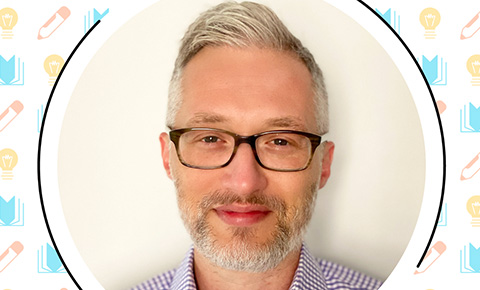David Rapp on Why Misinformation Sticks

After we take in information — whether true or not — it’s nearly impossible to avoid using it, Northwestern University psychologist David Rapp explained during the “Science of Reading: The Podcast.”
“You can try to make other memories more powerful,” Rapp said. “But in terms of being exposed to inaccurate ideas, once information is encoded into memory, it will potentially be there to influence you.”
Rapp, the Walter Dill Scott Professor of Learning Sciences in the School of Education and Social Policy, joined podcast host Susan Lambert to explore how we understand what we read — and how the persistence of misinformation can shape that understanding.
Reading comprehension isn’t just about decoding words, Rapp explained. “It’s about taking in information, thinking critically, and applying it in real-world contexts,” he said. This can include following directions, learning from textbooks, staying informed through news, or even gaining insights from fiction.
A major theme of the conversation was the difference between comprehension as a process and as a product. “Process” refers to mental activity while reading — paying attention, decoding language, evaluating ideas — while “product” is what remains afterward – the knowledge and understanding we can recall or use. Rapp noted that measuring process is challenging and sometimes requires clever experiments or neuroscientific tools.
He also addressed the stubborn nature of incorrect information, highlighting how it can shape memory and learning after initial exposure.
Rapp, long interested in how people generate inferences and understand the world after they read something, is now trying to identify and combat the consequences of exposure to misinformation. If researchers can understand that, he said, they may help people become more critical evaluators, so they don’t fall victim to inaccurate information.
“Sometimes our most effective processes actually lead us to misunderstand,” he said. “For example, if you're really good at encoding information to memory, that's great. But when you're exposed to inaccurate ideas, that's a problem.”
Timing also plays a role. Some research suggests that the most recent information we encounter triggers the greatest activation in the brain — meaning we’re more likely to retrieve it. That’s useful when the information is accurate, and much less so when it’s not.
Trust, confidence, and AI
In addition to understanding how people process information, Rapp studies factors such as trust in sources and self-confidence. If you trust someone, you’re more likely to believe what they say. But people often treat unknown sources as credible by default, he said.
High confidence, meanwhile, can reduce critical thinking, making people less likely to question what they think they know — even when they may be wrong. He said there’s a need for deeper contemplation before forming strong opinions. For example, people who skim short blog posts can feel like experts on complex subjects such as natural selection or politics, despite only beginning to learn about the topics.
Rapp’s research has found that reading introductory text can help. A 2025 study in Discourse Processes co-authored with graduate student Mandy Withall, found that including an opening passage can help people learn complex topics without inflating confidence — and that early feedback helps readers judge what they truly know.
Simply thinking about accuracy — whether prompted or self-initiated — also helps people avoid being influenced by false information on social media, according to a 2025 study he published in the Journal of Applied Research in Memory and Cognition.
Other recent work identifies core challenges in using AI as a thought partner. In a 2024 paper in the Journal of Applied Research in Memory and Cognition, Rapp and graduate student Sam Agnoli argued that success depends on three things: how people view AI, how much control they believe they have during the AI experience, and how carefully they evaluate the quality of the AI output.
Rapp’s ideas about what comprehension means — and how it can go astray — have evolved over the last decade, prompting him to think more about supporting teachers.
“It’s really complicated,” he said. “Obstacles might not just be about comprehension — it could be about difficulties with memory, attention, or prior knowledge. Teachers are being asked to diagnose and rectify and remediate all these different possibilities, and we need to generate projects and grants and supports to help them build interventions.”
In the meantime, he encourages teachers to reach out to him or other researchers for more information on reading and reading comprehension. “I love when people reach out for things they can apply in their classroom,” he said. “It might take me a little while to respond, but I will — because the goal is for the research to be applied to make the world better.”
Lean more at David Rapp's Reading Comprehension Lab.